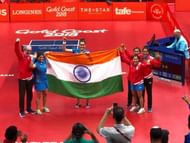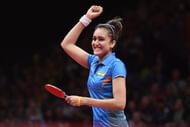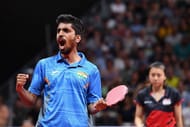What was not there in Gold Coast for an Indian sports fan? A hefty medal tally? Check. A little drama? Check. The endurance of experience? Check. The exuberance of youth? Double check. The 21st edition of the Commonwealth Games was all this and much more.
And, of course, like every other edition, the Gold Coast Commonwealth Games also threw up a new star. This time, though, the star was not an athlete. In fact, it was a sport -- table tennis, to be more precise -- a sport that has long been pushed back into the threshold of obscurity, at least in India.
You would argue that table tennis is an enormously popular sport. It is played widely throughout the country by many across schools and colleges, you would say. However, what you will not acknowledge is the fact that in India, table tennis is looked upon more as a leisure sport, not something that one should make a career out of.
Well, that surely changed in Gold Coast.
With the likes of Manika Batra, Mouma Das, Achanta Sharath Kamal and Sathiyan Gnanasekaran leading the way, the sport has now got a new lease of life in the country. Suddenly, everyone is talking about the eight medals the contingent brought back...suddenly, you are seeing a table tennis player headlining every newspaper, and every news channel.
While we garland the obvious heroes, we must also acknowledge all the effort that was put in. And only in that context, the name of one Massimo Costantini comes up.
Massimo, who?
Regarded as one of the all-time best table tennis players in Italy, Massimo Costantini is currently the chief coach of the Indian table tennis team. This is his second stint in India, having served as the chief coach of the national team from early 2009 till the end of the 2010 Commonwealth Games. He was reappointed in 2016 after the Rio Olympic Games, where he helmed the USA national team.
Across a playing career that lasted two decades, Costantini earned a lot of plaudits in and outside his country. He took part in several World Championships and represented Italy at the 1988 Seoul Olympics as well.

"I'm obviously very much satisfied with the performance of all the players," the soft-spoken Italian told Sportskeeda over the phone.
"Behind the eight medals, there was a very good team spirit and the will to support each other, even from the players who didn't get medals in the individual events. It was completely a team effort.
"Of course, everything could have been better. When we lost the bronze medal match, we could have won it and won the bronze. The silvers could have been gold, again. But this is sport, sometimes you're about to win and you lose and vice versa. It's not predictable. It's a skill-based game, sometimes the opponents produce more skill than you. Having said that, I have no regrets," he added.
'Team spirit, the key to success'
Costantini believes that it was the camaraderie among the players of the team that eventually led to success at the Commonwealth Games. This, though, was not a day's work. It was weeks of meticulous planning, implementation of the planning and ensuring everything went in accordance with the plan that helped in achieving this camaraderie.
"The key to success in this competition was the team spirit. This team spirit was not built in a day. This came from staying together, going for tournaments together, training together at camps...spending time together. When I arrived in India, I said, 'Give me time to work with the players and I'll give you results,'" Costantini recalled.
"That was the key, the more time we spent together, the better was the understanding, the better was the chemistry. By spending more time together, you can identify the problems faced by the players, their weaknesses, their psychology and so, you can adjust accordingly. If we didn't spend time together, then it would have been very, very difficult," he admitted, adding, "If you meet the players at the airport and go directly for a tournament, then there is no understanding, no feeling between the players, the coaches and the support staff."
"The plan was to create a good atmosphere where all the players are very much involved. From there, day after day, we have worked only for this result," he further added.
"It was my request to keep the entire team together for as long as possible. And, some of the players even gave up opportunities to play abroad. I told them right at the beginning, 'Look, this a very strong programme. There will be training in India as well as outside India. There will be a lot of international exposure. But there will be no time for you to do something else. So, stay focused on the programme and there will be results,'" the 60-year-old explained.
'This is just the start for Manika'

What can we say about Manika Batra? Over the last couple of weeks, she has found her way into the hearts of all Indian sports fans, just like the way Sania Mirza or Saina Nehwal had.
Manika returned from Gold Coast as India's only quadruple medallist. Two of the four medals were gold, en route to earning which she beat World No. 4 Tianwei Feng, twice. There were other significant wins, but the way she beat Feng, an Olympic silver medallist, stood out.
"Manika has improved by leaps in the last two months. She never imagined that she will improve so much in such a short span of time," said Costantini. "But, once again, the key was spending time together. That helped in developing an understanding. I could tell her, 'Manika, be brave. Try something different, create more opportunities with your style.'"
"And, it worked. Because she took it in a positive way. She became aware of the very many possibilities in which her complicated game could be expressed. Her success is not casual," he carefully added.
Why was it not 'casual'? To understand that, we have to refer to Costantini's blog.
In his blog, the Italian has explained how he helped Manika develop certain aspects in her game, in terms of variation. Here are some excerpts from the blog:
When I started working with her, her game was trivial, like -- intercepting the arriving ball with the long pimples creating the stop-and-go rhythm stop on the opponents and then attacking with a shy forehand, however with moderate spin, occasionally the switch of the racket handle to play a backhand with the regular rubber. After several months of work and field tests, I can say that her game has remained unchanged but the variations have increased and the attack is now very effective.
Playing against Manika is really difficult because there are no points of reference, each rally is different from the previous one, each spin is different, major, minor, null, lateral and so on. Perhaps I had already said it but I think that in the Women’s Team final match, Manika / Feng Tianwei, the Indian won a game scoring 11 points in 11 different ways.
"Her game is now more complete and I'm sure more things will come in the future. This is just the start," Costantini said.
'Explore, explore, explore'
For the Italian, getting better does not mean one is improving. Getting better at what you do is only natural, it can be easily obtained through practice. According to him, the only way to improve is to explore -- to get out of your comfort zone and try out new things. That's what he told Manika, that's what he told Sathiyan Gnanasekaran, that's what he has been telling every other kid who wants to succeed.
"Sathiyan, you know, is a great player. He has strong inside motivation but he needed to explore the other aspects of his game. All the players have to explore other skills, otherwise, you would remain a player with limited skills. Exploring more skills, more possibilities in terms of backhand, forehand, shots, serves, and many other technical aspects made Sathiyan even more strong," Costantini revealed.

"As I said before, this is a skill-based sport. If you have only one skill, you cannot compete with another player who has 10 skills. I have requested all the players...not just the top 5, all the players at the camp, about 40-50 players...to explore, explore, explore. I have told them not to be conservative because if you don't explore, it is very difficult to improve. You can play better, but playing better and improving overall are two different things. You improve when you implement something different in your game," he continued.
The coach was highy impressed with how Sathiyan responded. Costantini believes that the Tamil Nadu-based player will improve much more in the days to come.
"I told the same thing to Sathiyan, and he reacted to it. In fact, he responded very well. He is a young player, only 25, and I think, in the next four-six years -- I say six years because I want to include the 2024 Olympics -- you'll see him improve more and bring home many more laurels," he said.
The success in Gold Coast is but a 'symbol'
The Indian table tennis team's overall success in Gold Coast is bound to create a new trend, Costantini was hopeful of. Parents will start sending their children to table tennis classes. More and more young people will begin to take up the sport seriously instead of just playing it as a pass time. There will be renewed interest in the sport and perhaps, every single tournament in which the likes of Manika, Sathiyan and Sharath play, will be highlighted.
"Like in any other discipline, when you have big successes, it creates a strong background," said Costantini.
"The other day, at the airport, there was a big crowd present to welcome the entire team, which was coming back from Australia. More importantly, there were many kids in the crowd.
"Now these kids, in their imaginations, want to be the best at what they do. They want to achieve success in whichever field they go. So, if we win only at the domestic level and we don't win in international tournaments, these kids will think that they can only win at the domestic level because no one did it. But the moment, Manika Batra sets a new benchmark or Sharath Kamal achieves a new feat, the new generation will think, 'I can do it!'
"So, from inside, the motivation will come. So this is not just another success story, this is a symbol...this gives a new hope to the kids, to think big," the Italian asserted.
It's hard to imagine that it has been almost one week that the Commonwealth Games are over. But one cannot dwell on the past for long.
India's immediate next challenge is the World Championships, which will be held at Halmstad, Sweden from 29th April to 6th May. For the women's team, it will be only the second time in Championships Division while for the men's team, it will be the first time in Championships Division. On being asked about the plans ahead of the tournament, Costantini said that he felt the Indians could pull off some big upsets.
"Talking about the World Championships, of course, we have to recover before the tournament. We have to recover from being drunk with the attention we are getting. We will be heading to Sweden for a camp where we will prepare for the matches to come. I hope that this eagerness we have displayed in Gold Coast will be shown at the World Championships as well. There is a really, really good opportunity to cause a lot of upsets," the man with the Midas touch signed off.
